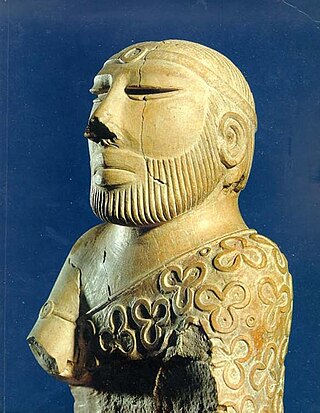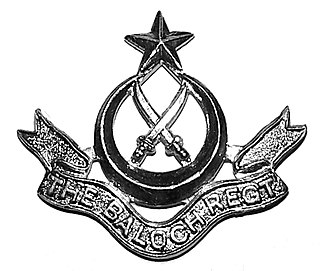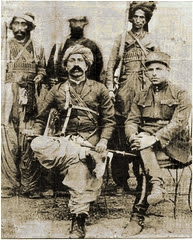Barazani is a Baloch tribe living in Iranian province Sistan and Baluchistan.
Barazani is a Baloch tribe living in Iranian province Sistan and Baluchistan.

Balochi, Balóchi or Baluchi (بلۏچی) is a Northwestern Iranian language spoken primarily in the Balochistan region of Pakistan, Iran and Afghanistan. In addition, there are speakers in Oman, the Arab states of the Persian Gulf, Turkmenistan, East Africa and in diaspora communities in other parts of the world. The total number of speakers, according to Ethnologue, is 8.8 million. Of these, 6.28 million are in Pakistan.

The Baloch or Baluch are a nomadic, pastoral, Western Iranic ethnic group native to the Balochistan region of South and Western Asia encompassing the countries of Pakistan, Iran, and Afghanistan. There are also Baloch diaspora communities in neighbouring regions, including in Central Asia, and the Arabian Peninsula.

Sistan and Baluchestan province is the second largest province of the 31 provinces of Iran, after Kerman province, with an area of 180,726 km2. It is in the southeast of the country, bordering Pakistan and Afghanistan, and its capital is the city of Zahedan.

The history of Balochistan refers to the history of the Balochistan region of Pakistan, Iran and Afghanistan. Vague allusions to the region were found in Greek historical records of around 650 BCE. Prehistoric Balochistan dates to the Paleolithic.
The Rind is a Baloch tribe, mainly living in Iran, Afghanistan, Pakistan and Gulf countries. According to Baloch folklore the tribe was founded by Rind Khan, one of Mir Jalal Khan's four sons.

Balochistan is a historical region in Western and South Asia, located in the Iranian plateau's far southeast and bordering the Indian Plate and the Arabian Sea coastline. This arid region of desert and mountains is primarily populated by ethnic Baloch people.

The Baloch Regiment is an infantry regiment of the Pakistan Army. The modern regiment was formed in May 1956 by the merger of 8th Punjab and Bahawalpur Regiments with the Baluch Regiment. Since then, further raisings have brought the strength of the Regiment to 27 battalions. The Baloch Regiment is descended from the infantry of the old British Indian Army and is named after Balochistan. Before 1991, it was called the Baluch Regiment but the spelling was changed to 'Baloch' to better reflect the correct pronunciation.

The 129th Duke of Connaught's Own Baluchis was an infantry regiment of the British Indian Army raised in 1846 as the 2nd Bellochee Battalion. It was designated as the 129th Duke of Connaught's Own Baluchis in 1903, and became 4th Battalion 10th Baluch Regiment in 1922. In 1947, it was allocated to Pakistan Army, where it continues to exist as 11th Battalion of The Baloch Regiment.
Mastung, the capital of Mastung District, is a town in the Balochistan province of Pakistan. It has an altitude of 1701 metres. The town is also the administrative centre of Mastung Tehsil, an administrative subdivision of the district – the town itself is administratively subdivided into two Union Councils.

The 10th Baluch or Baluch Regiment was a regiment of the British Indian Army from 1922 to 1947. After independence, it was transferred to the Pakistan Army. In 1956, it was amalgamated with the 8th Punjab and Bahawalpur Regiments. During more than a hundred years of military service, the 10th Baluch Regiment acquired a distinguished record amongst the regiments of the British Indian Army. Its list of honours and awards includes four Victoria Crosses.

The 130th King George's Own Baluchis (Jacob's Rifles) was an infantry regiment of the British Indian Army raised in June 1858 as the 1st Belooch Rifles; re-designated as 1st Regiment Jacob's Rifles in September. It was designated as 130th Jacob's Baluchis in 1903 becoming 5th Battalion (King George's Own) 10th Baluch Regiment (Jacob's Rifles) in 1922. In 1947, it was allotted to Pakistan Army, where it continues to exist as 12th Battalion of The Baloch Regiment.
The 126th Baluchistan Infantry was an infantry regiment of the British Indian Army raised in 1825 as the 2nd Extra Battalion of Bombay Native Infantry. It was designated as the 126th Baluchistan Infantry in 1903 and became 2nd Battalion 10th Baluch Regiment in 1922. In 1947, it was allocated to the Pakistan Army, where it continues to exist as 7th Battalion of The Baloch Regiment.

The 124th Duchess of Connaught's Own Baluchistan Infantry was an infantry regiment of the British Indian Army raised in 1820 as the 2nd (Marine) Battalion 12th Regiment of Bombay Native Infantry. It was designated as the 124th Duchess of Connaught's Own Baluchistan Infantry in 1903 and became 1st Battalion 10th Baluch Regiment in 1922. In 1947, it was allocated to Pakistan Army, where it continues to exist as 6th Battalion of The Baloch Regiment.

Mulla Kamal Khan or Kamalan was a Baluch folklore vocalist. He was born in 1941 in the village of Latidan, Dashtyari district, Chabahar County in the Sistan and Baluchistan province of Iran. His talent was first discovered in a traditional Balochi wedding ceremony, where many Baloch tribesmen gathered to listen traditional Balochi heroic songs. He went on to become one of the most influential singers in Baluchistan and gained fame among Baloch people and even among non-Balochis.

Dost Mohammad Khan Baloch, also known as Mir Dost Muhammad Khan Baluch, was a ruler in Iranian (Western) Baluchistan from 1921 till 1928.
The Yarahmadzai (Shahnavazi) is a Baloch tribe from Iranian Balochistan. The main population of the tribe is settled in an area called Sarhad in the city of Khash. The population of the Yarahmadzais is an estimated 30,000 and they are divided into three smaller groups, Sohrabzai, Hossenzai and Rahmetzai.
Al Balushi is a tribal surname common in the Persian Gulf region, particularly Oman, the United Arab Emirates, Iraq, Kuwait, Qatar, Bahrain and Saudi Arabia. It is a nisba and is Arabized from the term Balochi, denoting someone who has Baloch ancestry. People carrying this surname trace their tribal origins to Balochistan, a region in south Iran and Pakistan located across the Persian Gulf. Their ancestors predominantly came from the Makran coast in the 19th century. The Al Balushi speak Arabic, while some also use Balochi or Persian. They are mainly Sunni Muslims. They are a populous tribe in Oman, the UAE and Bahrain.
The attack of Tasooki was a terrorist attack against Iran. It took place at 21:00 on 25 Esfand 1384 in Zabol-Zahedan road near the police station. The perpetrators were members of the Baloch religio-political insurgency named Jundallah (Iran). The attack left 22 dead and 7 captured.in that night the forces of jundallah and Abdolmalek rigi attacked several passing vehicles, mostly buses, in the guise of police and killed 21 Shia male passengers in front of their wives and children.
The Rakhshani are a major Brahui-Baloch tribe who live in Pakistan and Iran. They mostly live in Qalat and Lasbela, which is located in the Rakhshan Division.
Uzbakzai or Uzbakzahi a Baloch tribe, which is a subset of Rakhshani tribe living in Afghanistan, Iran and Pakistan. In Afghanistan the main place of Uzbakzai tribe is Shishawa village in Khash Rod and Qazi village in Chakhansour districts of Nimroz province, and Karez Latif village in Anardara district of Farah province.